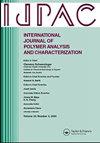水解角蛋白改性硬质聚氨酯泡沫的制备及其热稳定性和燃烧性能
IF 1.7
4区 工程技术
Q4 POLYMER SCIENCE
International Journal of Polymer Analysis and Characterization
Pub Date : 2023-10-03
DOI:10.1080/1023666X.2023.2270805
引用次数: 0
摘要
摘要以角蛋白水解为原料,采用全水发泡“一步法”合成了硬质聚氨酯泡沫材料。采用热重分析、热解动力学分析、锥量热法和烟密度(Ds)研究了角蛋白水解对RPUFs热稳定性和燃烧性能的影响。结果表明,角蛋白水解率为12.5 wt%的改性RPUF-HK5具有最低的质量损失、最高的综合程序热解温度、最高的活化能、最低的Ds(25.32和22.57)、最高的透光率(64.30%和67.46%)和最高的总放热量(1.85 MJ/m2、2.18 MJ/m2和2.92 MJ/m2),表明RPUF-HK5具有较好的热稳定性和燃烧性能。目前的研究结果为生物基改性制备热稳定性好的rpuf提供了有益的参考。关键字:聚氨酯泡沫水解角蛋白燃烧性能热稳定性披露声明我们声明,我们与其他个人或组织没有任何财务和个人关系,这些关系可能会不恰当地影响我们的工作,在任何产品、服务和/或公司中没有任何性质或种类的专业或其他个人利益,这些利益可能会被解释为影响文章中所呈现的立场或对文章的审查。数据可用性声明应作者要求提供的数据。支持本研究结果的数据可根据通讯作者的合理要求提供。经费:辽宁省教育厅科研基金资助项目[批准号:)JYT2020011)得到了极大的认可。本文章由计算机程序翻译,如有差异,请以英文原文为准。
Fabrication of hydrolyzed keratin-modified rigid polyurethane foams and its thermal stability and combustion performance
Rigid polyurethane foams (RPUFs) were synthesized with hydrolyzed keratin using the “one-step method” of all-water foaming. Thermogravimetric analysis, pyrolysis kinetics analysis, cone calorimetry and smoke density (Ds) were used to investigate the effects of hydrolyzed keratin on thermal stability and combustion performance of RPUFs. The results showed that the modified RPUFs with 12.5 wt% hydrolyzed keratin (RPUF-HK5) had the lowest mass loss, the highest integrated program pyrolysis temperature, the highest activation energy, the lowest Ds (25.32 and 22.57), the highest light transmittance (64.30% and 67.46%), and total heat release (1.85 MJ/m2, 2.18 MJ/m2 and 2.92 MJ/m2), which indicated that RPUF-HK5 had better thermal stability and combustion performance. The current research results provided a useful reference for the preparation of the RPUFs with good thermal stability by bio-based modification.
求助全文
通过发布文献求助,成功后即可免费获取论文全文。
去求助
来源期刊
CiteScore
3.50
自引率
5.30%
发文量
37
审稿时长
1.6 months
期刊介绍:
The scope of the journal is to publish original contributions and reviews on studies, methodologies, instrumentation, and applications involving the analysis and characterization of polymers and polymeric-based materials, including synthetic polymers, blends, composites, fibers, coatings, supramolecular structures, polysaccharides, and biopolymers. The Journal will accept papers and review articles on the following topics and research areas involving fundamental and applied studies of polymer analysis and characterization:
Characterization and analysis of new and existing polymers and polymeric-based materials.
Design and evaluation of analytical instrumentation and physical testing equipment.
Determination of molecular weight, size, conformation, branching, cross-linking, chemical structure, and sequence distribution.
Using separation, spectroscopic, and scattering techniques.
Surface characterization of polymeric materials.
Measurement of solution and bulk properties and behavior of polymers.
Studies involving structure-property-processing relationships, and polymer aging.
Analysis of oligomeric materials.
Analysis of polymer additives and decomposition products.

 求助内容:
求助内容: 应助结果提醒方式:
应助结果提醒方式:


